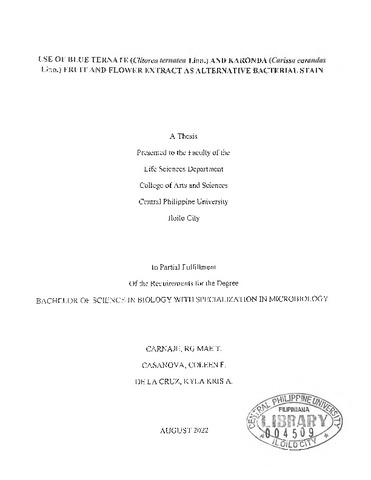Use of blue ternate (Clitorea ternatea Linn.) and karonda (Carissa carandas Linn.) fruit and flower extract as alternative bacterial stain

Page views
2,458Date
2022-08Thesis Adviser
Defense Panel Chair
Defense Panel Member
Share
Metadata
Show full item record
Abstract
It has been known that bacterial staining is one of the fundamental procedures done when identifying microorganisms, hence, learning about it and obtaining skills to perform it has been given great importance. This activity led to the constant exposure of the students and researchers, alike, to the chemicals used to achieve results. The chemicals used, or in this case, the dyes, were synthetic in nature, thus they pose possible danger to those who are continuously using it. The purpose of this study is to determine the possibility of karonda (C. carandas) fruit and blue ternate (C. ternatea) flower crude extracts as alternative bacterial stains by observing their staining intensities on S. aureus. Methylene blue served as the positive control. Tannic acid was added as a mordant to the crude extracts and staining intensity was based on the Likert scale. Results showed that blue ternate flower had a mean score of 0.8 (low staining intensity), blue ternate with tannic acid had a mean score of 1.8 (average staining intensity) while karonda fruit crude extract had a mean score of 1.0 (low staining intensity), karonda with tannic acid had 1.2 (average staining intensity) compared to the control group which had a mean score of 3.0 (very high staining intensity. This means that the staining intensity of the crude extracts obtained from natural sources were way beyond the staining intensity of methylene blue which is of synthetic origin.
Description
Abstract only
Suggested Citation
Carnaje, R. M. T. , Casanova, C. F. & De La Cruz, K. K. A. (2022). Use of blue ternate (Clitorea ternatea Linn.) and karonda (Carissa carandas Linn.) fruit and flower extract as alternative bacterial stain (Unpublished thesis). Central Philippine University, Jaro, Iloilo City.
Type
ThesisKeywords
Department
Life Sciences Department, College of Arts and SciencesDegree
Bachelor of Science in Biology with specialization in MicrobiologyShelf Location
Filipiniana Theses 570.072 C214
Physical Description
vii, 54 leaves

